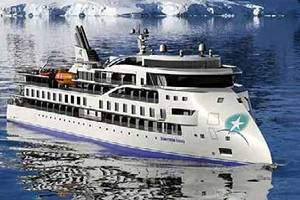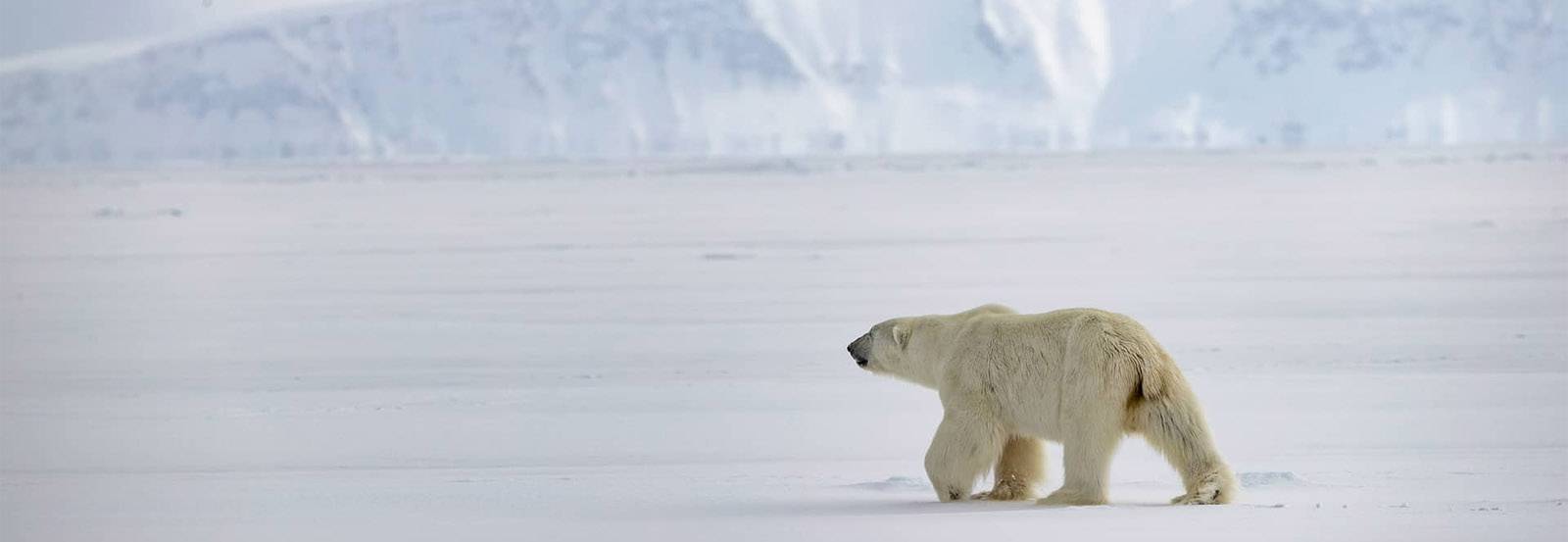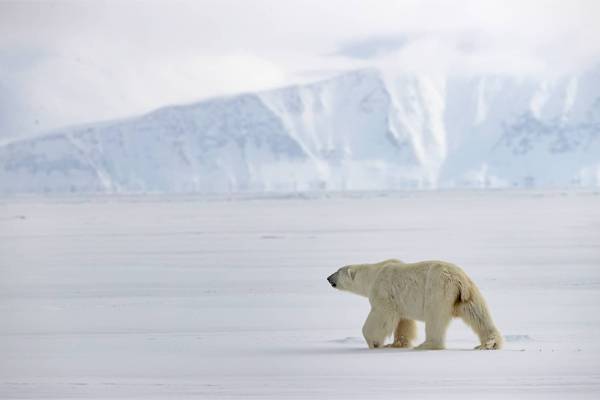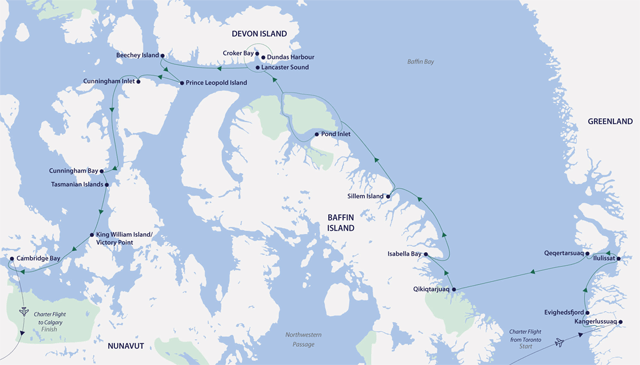HIGHLIGHTS
- Stand
in awe of Ilulissat Icefjord, a UNESCO World Heritage Site
- Hike
on Devon Island, the world’s largest uninhabited island,
which features stunning geology, fjords and glacial valleys to explore
- On
Beechey Island, visit memorials and graves of explorers from John
Franklin’s expedition
- Keep
watch with the hope of spotting iconic Arctic wildlife including musk
ox, polar bears, beluga whales, walrus and perhaps narwhal
DATES / RATES
Rates are listed per person
|
| Start Date | End Date | From EUR | From USD |
|---|
| Aug 25, 2025 | Sep 09, 2025 | 21,072 |
24,795 |
| Sep 07, 2025 | Sep 22, 2025 | 21,072 |
24,795 |
Rates are listed per person
|
| Start Date | End Date | From EUR | From USD |
|---|
| Aug 25, 2025 | Sep 09, 2025 | 21,072 |
24,795 |
| Sep 07, 2025 | Sep 22, 2025 | 21,072 |
24,795 |
ITINERARY
Please
Note: The 7 Sep 2025 sailing
is an Eastbound voyage in the reverse direction
Day
1 Arrive Toronto
Having
made your way to Toronto, check in at our group hotel at Toronto
Airport. Please visit the Aurora Expeditions hospitality desk to
collect your luggage cabin tags and to speak with our ground operations
team, who may have information to share with you about pre-embarkation
procedures and also the charter flight to Nuuk tomorrow. You will
receive Aurora Expeditions cabin tags for your luggage. Please clearly
label the tags with your name and ship cabin number.
Accommodation:
Westin Toronto Airport Hotel (or similar) for the Westbound
voyage. Residence Inn by Marriott Calgary Downtown / Beltline
District (or similar) for the Eastbound voyage.
Day
2 Embarkation, Nuuk
Please
ensure that your luggage is fitted with cabin tags clearly labelled
with your name and cabin number. Any valuables or personal items should
be kept on you throughout the day. Your luggage will be delivered to
your cabin ahead of your arrival on board. After breakfast at the
hotel, board our charter flight to Nuuk, where the Greg Mortimer
awaits. After boarding, there is time to settle into your cabin before
our important safety briefings. This evening, meet your expedition team
and crew.
Day
3 At sea, Sisimiut
After
a morning sailing north towards the Arctic Circle, we arrive in
Sisimiut, Greenland’s second largest town. Sisimiut is
located approximately 54 kilometres (33.5 miles) north of the Arctic
Circle, meaning that during summer, you can experience the midnight sun
here. The town is famous for the old blue church with the
gate made of whale bone. In the cosy museum next door to the church,
you will find an excellent reconstruction of an Inuit turf house as
well as exhibits of local history and early life in Greenland. Sisimiut
offers hiking trails with various degrees of difficulty. The easier
trails take you through the town itself, its outskirts and into the
mountains, where you will find spectacular vantage points.
Approximately
4,500 years ago, the Saqqaq culture arrived from Canada and settled in
the area. They lived here for approximately 2,000 years, after which
they mysteriously disappeared from the area. The Dorset culture arrived
around 500 CE and stayed until the 1200s until they were replaced by
the Thule culture, and today, the majority of the population of
Sisimiut are descendants of the Thule culture.
Day
4 Ilulissat
Known
as the ‘birthplace of icebergs’, this region
produces some of the most dazzling icebergs found anywhere on Earth.
Hike to the UNESCO World Heritage-listed Icefjord and stand in awe of
its immensity. Sermeq Kujalleq, also known as Jakobshavn Glacier, is
the most productive glacier – not only in Greenland but the
entire Northern Hemisphere. It produces 20 million tonnes of ice each
day, all floating into the Ilulissat Icefjord and Disko Bay. Conditions
permitting, enjoy a Zodiac cruise at the mouth of the fjord and kayak
through sea ice and icebergs. An optional 90-minute helicopter flight
over the ice fjord is a truly once-in-a-lifetime experience.
Optional
helicopter flight (90 mins): this excursion is the only way you can get
close to the gigantic glacier. The 12- seater helicopter departs from
Ilulissat Airport sweeping over hills, lakes and ice fjords. Land on
the mountain at Kangia, in the middle of the preserved area, where you
can revel in the incredible surroundings. On the return flight to
Ilulissat, fly above the edge of the glacier with breathtaking views of
the massive icebergs drifting in the fjord. The views of some of the
largest icebergs that become stranded on a moraine underneath the
water, just outside the town, offers a wonderful finale to this
excursion. Please note that this excursion requires a minimum of 8
passengers to operate.
Day
5 Qeqertarsuaq (Disko Island)
This
compelling island seems to have more in common with Iceland than
Greenland. While most of the interior is mountainous and glaciated, its
beautiful shorelines boast black sandy beaches, unusual basalt columns,
hot springs and dramatic lava formations. Zodiac cruise in Disko Bay,
which features fascinating geology. It is also hotspot for marine life
including humpback, fin, minke and bowhead whales.
Day
6 At sea, Qikiqtarjuaq, Baffin Island
Our
team of experts entertain us with informative talks about wildlife,
geology and epic tales of early explorers such as Franklin and
Amundsen. Reaching the coast of Baffin Island, we may encounter
Greenland’s famous icebergs. Keep watch for humpback, sei,
sperm and fin whales, as well as various species of seals such as ring
and harp seal.
Days
7-9 Baffin Island
The
east coast of Baffin Island features hidden bays that are feeding
grounds for bowhead whales and where glaciers calve into the sea. Sail
along inlets and fjords surrounded by towering mountains that feature
impressive geology. Some of the places that we may visit include: Home
Bay, Sillem Island, John Ford Fjord, Sam Ford Fjord and Scott Inlet.
Conditions permitting, we hope to go ashore at Pond Inlet and be
treated to a warm welcome from the local community. Covered with
mountains, icefields, steep cliffs, snowfields and glaciers, Bylot
provides nesting habitat for large numbers of thick-billed murres and
black-legged kittiwakes. A total of 74 unique species of arctic birds
thrive on this island. Due to the richness of the wildlife and the
beauty and diversity of the landscapes in the area, a
large
portion of the island was also included in the Sirmilik National Park,
established in 2001. We plan to sail along the coastline of Bylot
Island, where we hope to enjoy the scenery and outstanding birdlife.
Days
10-11 Devon Island, Lancaster Sound
At
a latitude of almost 75° degrees north, we are now truly in the
High Arctic. Here, nutrient-rich waters support an abundance of
wildlife, giving the area the moniker ‘wildlife
superhighway’ of the Arctic. Devon Island is the largest
uninhabited island on Earth and features stunning geology, with
flat-topped mountains and glacial valleys giving Devon Island its
unique character. We hope to visit Dundas Harbour to enjoy offers walks
on undulating tundra, and perhaps some birdwatching. Other possible
places that we might visit include Croker Bay and Maxwell Bay. A
dilapidated Royal Canadian Mounted Police outpost and remnants of a
Hudson’s Bay Company trading post can be found here. In the
bay, walruses are often present.
At
the western end of Devon Island lies Beechey Island, where we plan to
land. Named after Frederick William Beechey, the island is one of
Canada’s most important arctic sites and is a designated
Canadian National Historic Site. During the Franklin expedition of
1845–46, Franklin attempted to sail through the Northwest
Passage with HMS Erebus and HMS Terror, with perilous results
– three of his men are buried here. Roald Amundsen landed at
Beechey Island in 1903, during the first successful voyage by ship to
fully transit the Northwest Passage from the Atlantic Ocean to the
Pacific Ocean
Days
12–14 Expedition cruising
Note:
In true expeditionary style, our itinerary for the following days is
heavily dependent on unpredictable sea ice. The following are places we
hope to visit.
Prince
Leopold Island
On
the southern side of Lancaster Sound from Beechey Island lie the
towering bird cliffs of Prince Leopold Island, a historic site where in
1848, English explorer James Clark Ross overwintered during the search
for the missing Franklin expedition. Prince Leopold Island is the most
important bird sanctuary in the Canadian Arctic, with approximately
500,000 birds nesting here in summer. Ringed seals are often spotted on
the sea ice around the island and polar bears often lurk nearby. The
shallow gravel beds attract beluga whales, who come to moult in this
part of the Arctic each summer.
Cunningham
Inlet
On
the north coast of Somerset Island, when factors such as weather and
whale behaviour align, you might see the amazing spectacle of hundreds
of beluga whales shedding their skin on shallow sandy banks. The local
scenery makes for excellent guided walks, where waterway trails lead to
waterfalls and higher ground.
Prince
Regent Inlet, Fort Ross
Sailing
down the east coast of Somerset Island, you might spot beluga whales
and narwhals as they feed on the large numbers of arctic char that
enter Creswell Bay in late summer. An important bird area, the bay also
attracts such species as black-bellied plovers, king eiders and
white-rumped sandpipers. At Fort Ross, see an abandoned
Hudson’s Bay Company trading outpost founded in 1937, which
closed in 1949 because supply ships could not get through the thick sea
ice. Enjoy guided walks on the tundra.
Bellot
Strait
A
deep and windy waterway bordered by steep slopes, Bellot Strait is
characterised by strong, swirling, tidal currents that require
navigation to be undertaken close to times of slack water (four times a
day). Point Zenith, the most northern continental point of the Americas
is located in the strait.
Note: Due to
swirling currents up to 10 knots, Bellot Strait is better transited
during eastbound voyages because if it is blocked, there is the
alternative to continue north through Peel Sound. On a westbound
voyage, it would be necessary to make a long detour back north through
Prince Regent Inlet.
Coningham
Bay
Across
from Victoria Strait, Coningham Bay lies on the shores of Prince of
Wales Island. This is a polar bear hotspot where the majestic creatures
come to feast on beluga whales often trapped in the rocky shallows at
the entrance to the bay. It is not unusual to find the shoreline
littered with whale skeletons – and very healthy-looking
polar bears!
King
William Island
Remains
attributed to the Franklin expedition have been found at 35 different
locations on King William Island and on nearby Adelaide Peninsula.
South of Cape Felix, in Victoria Strait, we hope to get close to where
the HMS Erebus and HMS Terror were abandoned in 1848.
Day
15 Cambridge Bay
In
Cambridge Bay, farewell the crew, expedition team and fellow travellers
before a Zodiac shuttle whisks you ashore. Transfer to the airport for
a charter flight to Calgary, where you will stay overnight.
Accommodation:
Residence Inn by Marriott Calgary Downtown / Beltline District (or
similar)
Day
16 Depart Calgary
After
breakfast, check-out of your room and continue your journey.
Greg Mortimer (Luxury Expedition, 120-guests)
Capable of negotiating the strongest winds and waves, the Greg Mortimer is built to world-class polar standards. It is designed in close consultation with expedition specialists, taking advantage of Auroras more than 25 years of experience.
 (Click image to view Ship details)
(Click image to view Ship details)
WHAT'S INCLUDED
- One
night’s hotel accommodation with breakfast in Toronto on day
1
- Charter
flights: Toronto-Kangerlussuaq // Cambridge Bay-Calgary
- Sightseeing
in Kangerlussuaq (time permitting) and transfer to the pier for
embarkation on day 2
- Transfer
from harbour to airport in Cambridge Bay
- One
night’s hotel accommodation with breakfast in Calgary on day
16
- On-board
accommodation during voyage including daily cabin service
- All
meals, snacks, tea and coffee during voyage
- Beer,
house wine and soft drinks with dinner
- Captain’s
Welcome and Farewell reception including four-course dinner, house
cocktails, house beer and wine, non-alcoholic beverages
- All
shore excursions and Zodiac cruises
- Educational
lectures and guiding services from expedition team
- Complimentary
access to onboard expedition doctor and medical clinic (initial
consult)
- Complimentary
3-in-1 polar jacket
- Comprehensive
pre-departure information
- Port
surcharges, permits and landing fees
- Gratuities
for ship crew
Not
Included
- International
or domestic flights, unless specified
- Transfers
not mentioned in the itinerary
- Airport
arrival or departure taxes
- Passport,
visa, reciprocity fees and vaccination charges
- Travel
insurance or emergency evacuation charges
- Hotels
and meals not included in itinerary
- Optional
excursions not included in the itinerary
- Optional
activity surcharges
- All
items of a personal nature including but not limited to: alcoholic
beverages and soft drinks (outside of dinner service), laundry
services, personal clothing, medical expenses, Wi-Fi, email or phone
charges
ADVENTURE
OPTIONS
- Sea
Kayaking: USD 1,160
- Bird
watching: Free
- Lectures
on wildlife, our environment, history and destinations: Free
- Photography:
Free
- Polar
plunge: Free
- Trips
ashore: Free
- Walking:
Free
- Whale
and mammal spotting: Free
- Zodiac
cruises: Free







